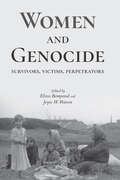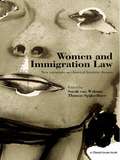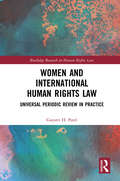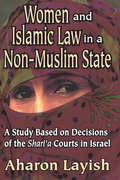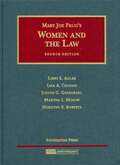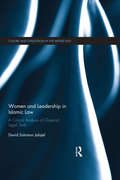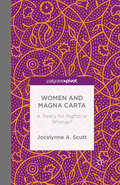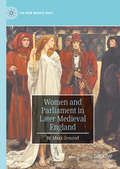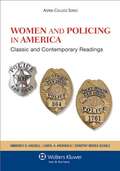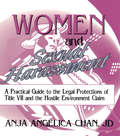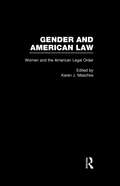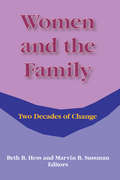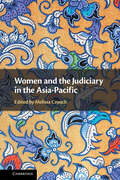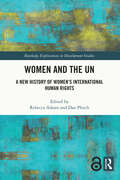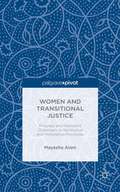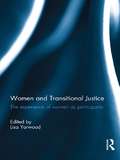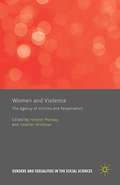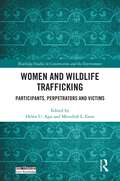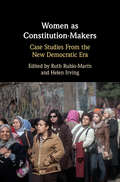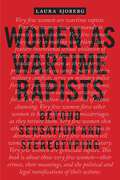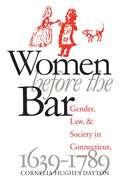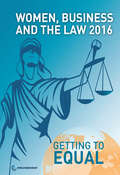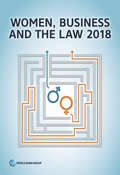- Table View
- List View
Women and Genocide: Survivors, Victims, Perpetrators
by Elissa Bemporad and Joyce W. WarrenEssays that use “gender as a critical lens for staging intersectional, multidisciplinary investigations of genocide in the 20th and 21st centuries” (Reading Religion).The genocides of modern history—Rwanda, Armenia, Guatemala, the Holocaust, and countless others—and their effects have been well documented, but how do the experiences of female victims and perpetrators differ from those of men? In Women and Genocide, human rights advocates and scholars come together to argue that the memory of trauma is gendered and that women’s voices and perspectives are key to our understanding of the dynamics that emerge in the context of genocidal violence. The contributors of this volume examine how women consistently are targets for the sexualized violence that serves as an instrument of ethnic cleansing, how female perpetrators take advantage of the new power structures, and how women are involved in the struggle for justice in post-genocidal contexts. By placing women at center stage, Women and Genocide helps us to better understand the nexus existing between misogyny and violence in societies where genocide erupts.“It elegantly bridges the historical divide between the study of political violence and the study of gendered violence in the so-called domestic sphere . . . Women and Genocide is an immense scholarly accomplishment that has the potential to fund creative advances in each of the scholarly disciplines it engages, as well as human rights, peace, and anti-violence programs of advocacy.” —Reading Religion
Women and Immigration Law: New Variations on Classical Feminist Themes
by Sarah Van Walsum Thomas SpijkerboerThis book examines immigration law from a gender perspective. It shows how immigration law situates gender conflicts outside the national order, projecting them onto non-western countries, exotic cultures, clandestine labour and criminal organizations. In doing so, immigration law sustains the illusion that gender conflicts have moved beyond the pale of European experience. In fact, the classical feminist themes of patriarchy, the gendered division of labour and sexual violence are still being played out at the heart of Europe's societies, involving both citizens and migrants. This collection of essays demonstrates how the seemingly marginal perspective of immigration law highlights Europe's unresolved gender conflicts and how a gender perspective can help us to rethink immigration law.
Women and International Human Rights Law: Universal Periodic Review in Practice (Routledge Research in Human Rights Law)
by Gayatri H. PatelThis book presents the findings of the first comprehensive study on the most recent and most unique and innovative method of monitoring international human rights law at the United Nations. Since its existence, there has yet to be a complete and comprehensive book solely dedicated to exploring the Universal Periodic Review (UPR) process. Women and International Human Rights Law provides a much-needed insight to what the process is, how it operates in practice, and whether it meets its fundamental aim of promoting the universality of all human rights. The book addresses the topics with regard to international human rights law and will be of interest to researchers, academics, and students interested in the monitoring and implementation of international human rights law at the United Nations. In addition, it will form supplementary reading for those students studying international human rights law on undergraduate programmes and will also appeal to academics and students with interests in political sciences and international relations.
Women and Islamic Law in a Non-Muslim State: A Study Based on Decisions of the Shari'a Courts in Israel
by Ahron LayishThis book is methodologically unique in scholarly literature on Muslim society. Its originality lies in the fact that the rich material offered by the shari'a courts is given a thorough analysis with a view to drawing conclusions about the present-day phenomena in Arab society and processes that the society has been undergoing in modern times.Aharon Layish examines every aspect of the social status of Muslim women that finds expression in the shari'a courts: the age of marriage, stipulations inserted in the marriage contract, dower, polygamy, maintenance and obedience, divorce, custody of the children, guardianship, and succession. Each chapter opens with a short legal introduction based on all the sources of law applying in shari'a courts, followed by social analyses and a study of the attitudes and approaches of the qadis, or Muslim religious judges. Layish examines the relationship between shari'a and Israeli legislation: Do shari'a courts have regard to the provisions of Israeli law? What is the relationship between shari'a and social custom, and which is decisive in regard to Israeli Muslim women? To what extent does Israeli law actually affect Israeli Muslim women? What is the attitude of the qadis, toward Israeli legislation?Women and Islamic Law in a Non-Muslim State is an important and original study that will be of interest to students and scholars of Islamic law, comparative law, sociology, and modernization.
Women And The Law, 4th (University Casebook Ser.)
by Dorothy Roberts Libby Adler Lisa Crooms-Robinson Judith Greenberg Martha MinowOrganized around three central topics of work, family, and body, this book reflects a multiplicity of feminist stances and critiques. Highlights include treatment of same-sex marriage developments; sustained treatment of perspectives and problems affecting women of color; contemporary assessments of sexual harassment law; expanded treatment of women and the labor market, the economics of divorce, pornography, and prostitution; federal civil rights and state tort law responses to domestic violence; and current regulation of women's reproductive decisions and critiques of reproductive technologies.
Women and Leadership in Islamic Law: A Critical Analysis of Classical Legal Texts (Culture and Civilization in the Middle East)
by David Solomon JalajelIslamic law has traditionally prohibited women from being prayer leaders and heads of state. A small number of Muslims today are beginning to challenge this stance, but they face considerable opposition from the broader Muslim community. ‘Women and Leadership in Islamic Law’ examines the assumption within much existing feminist scholarship that the patriarchal nature of pre-Islamic and early Muslim Near Eastern Society is the primary reason for the development of Islamic legal rulings prohibiting women from leadership positions. It claims that the evolution of Islamic law was a complex process, shaped by numerous cultural, historical, political and social factors, as well as scriptural sources whose importance cannot be dismissed. Therefore, the book critically examines a broad survey of legal works from the four canonical Sunni schools of law to determine the factors that influenced the development of the legal rulings prohibiting women from assuming various leadership roles. The passages that elaborate rulings about women’s leadership are presented in translation as an appendix to the research, and are then subjected to a variety of critical analyses to identify the reasons, influences, and assumptions underlying those rulings. This is the first time works of all four schools of law have been subjected to this kind of analysis for the express purpose of determining the extent to which gender attitudes have influenced and determined the rulings. This book will therefore be a vital resource for students and scholars of Islamic Studies, Religious Studies and Gender Studies.
Women and The Magna Carta: A Treaty for Control or Freedom?
by Jocelynne ScuttOn the eight-hundredth anniversary of the Magna Carta, Women and the Magna Carta investigates what the charter meant for women's rights and freedoms from an historical and legal perspective.
Women and Parliament in Later Medieval England (The New Middle Ages)
by W. Mark OrmrodThis Palgrave Pivot provides the first ever comprehensive consideration of the part played by women in the workings and business of the English Parliament in the later Middle Ages. Breaking new ground, this book considers all aspects of women’s access to the highest court of medieval England. Women were active supplicants to the Crown in Parliament, and sometimes appeared there in person to prosecute cases or make political demands. It explores the positions of women of varying rank, from queens to peasants, vis-à-vis this male institution, where they very occasionally appeared in person but were more usually represented by written petitions. A full analysis of these petitions and of the official records of parliament reveals that there were a number of issues on which women consistently pressed for changes in the law and its administration, and where the Commons and the Crown either championed or refused to support reform. Such is the concentration of petitions on the subjects of dower and rape that these may justifiably be termed ‘women’s issues’ in the medieval Parliament.
Women and Policing in America: Classic and Contemporary Readings
by Kimberly D. Hassell Carol A. Archbold Dorothy Moses SchultzVirtually unique in the field, Women and Policing in America deals with women as criminal justice professionals, rather than as victims or perpetrators. It is the only coursebook offering a diverse selection of peer-reviewed articles devoted to women in American policing. With comprehensive, accessible chapter introductions by co-authors who are among the most authoritative and respected professionals in the field, Women and Policing in America will become a foundational text for this rapidly growing area of research, college study and employment.
Women and Sexual Harassment: A Practical Guide to the Legal Protections of Title VII and the Hostile Environment Claim
by Robert C Berring Anja A ChanHere is a valuable guide that saves researchers investigating sexual harassment in the workplace enormous amounts of time and money. Focusing on the hostile environment claim under Title VII of the Civil Rights Act of 1964, Women and Sexual Harassment is a complete resource tool. In one easy-to-use volume, it provides a detailed background and history of the hostile environment claim as well as an extensive guide on how to use and where to find the best resources available on this topic. Unlike some legal books, Chan’s book does not require cover-to-cover reading to access pertinent information. Anyone, whether they are interested in the specifics of the hostile environment claim or sexual harassment in general, will be able to locate the information they’re looking for with the help of this handy guide. It saves enormous amounts of time, effort, and money for researchers by providing extensive listings and evaluations of statutes, cases, agency decisions, law review articles, annotations, and books containing information on this subject. Readers can use the book to get a better understanding of the hostile environment claim or use it like a dictionary to pinpoint the specific resources that will be most useful to their area of research. Women and Sexual Harassment is logically divided into five complete parts to make it easy to use: Part 1: Clearly explains how to best use the book to access specific information. Part 2: Describes the history and present state of the hostile environment claim in a manner that is to the point, yet is more thorough than descriptions of the claim found in articles, cases, or other sources. Part 3: Research guide--Directs researchers to the best sources for information, categorized by type and area. Includes tips that will save hours in the library and will help researchers find the most up-to-the-minute articles and cases. Part 4: Bibliography of primary legal sources--Covers statutes, regulations, and case law on the hostile environment claim and sexual harassment. Part 5: Bibliography of secondary sources--Includes books, articles, surveys, and legislative history.The annotated bibliography, broken down by type of source and type of information, not only points researchers in the right direction but also steers them away from sources that seem valuable from their title, but are in fact not worthwhile. The insightful written analysis of the hostile environment claim alone provides researchers unfamiliar with the subject with a clearly written history and definition of the claim, its key elements, employer liability, statute of limitations, remedies, considerations of discovery and evidence, and related claims. Women and Sexual Harassment is an invaluable guide for all types of researchers including victims of sexual harassment considering filing a hostile environment claim, scholars interested in women’s issues, attorneys unfamiliar with this area, employers interested in limiting their liability by taking steps to prevent sexual harassment in their workplaces, and law students in any level of courses related to sex discrimination or sexual harassment.
Women and the American Legal Order (Gender and American Law: The Impact of the Law on the Lives of Women)
by Karen J. MaschkeMultidisciplinary focus Surveying many disciplines, this anthology brings together an outstanding selection of scholarly articles that examine the profound impact of law on the lives of women in the United States. The themes addressed include the historical, political, and social contexts of legal issues that have affected women's struggles to obtain equal treatment under the law. The articles are drawn from journals in law, political science, history, women's studies, philosophy, and education and represent some of the most interesting writing on the subject. The law in theory and practice Many of the articles bring race, social, and economic factors into their analyses, observing, for example, that black women, poor women, and single mothers are treated by the wielders of the power of the law differently than middle class white women. Other topics covered include the evolution of women's legal status, reproduction rights, sexuality and family issues, equal employment and educational opportunities, domestic violence, pornography and sexual exploitation, hate speech, and feminist legal thought. A valuable research and classroom aid, this series provides in-depth coverage of specific legal issues and takes into account the major legal changes and policies that have had an impact on the lives of American women.
Women and the Family: Two Decades of Change
by Beth Hess Marvin B SussmanDespite the pervasive changes that have taken place in women’s lives in the past twenty-five years--increased participation in the labor force, the attainment of higher levels of education, and higher salaries--comparable changes in the division of family labor and in the roles of men have lagged considerably. In this timely book, the editors and other experts in feminism and family studies examine the effects of two decades of influence by the women’s movement on sex roles and child rearing. While applauding some positive changes, the contributors point to powerful forces of resistance to equality between the sexes, especially “the question of family”--the fear of depriving children of maternal attachment and the belief that working mothers are placing their own interests above those of other family members--as an issue that, until fully addressed, prevents genuine equality between the sexes.
Women and the Judiciary in the Asia-Pacific
by Melissa CrouchCourts can play an important role in addressing issues of inequality, discrimination and gender injustice for women. The feminisation of the judiciary – both in its thin meaning of women's entrance into the profession, as well as its thicker forms of realising gender justice – is a core part of the agenda for gender equality. This volume acknowledges both the diversity of meanings of the feminisation of the judiciary, as well as the complexity of the social and cultural realisation of gender equality. Containing original empirical studies, this book demonstrates the past and present challenges women face to entering the judiciary and progressing their career, as well as when and why they advocate for women's issues while on the bench. From stories of pioneering women to sector-wide institutional studies of the gender composition of the judiciary, this book reflects on the feminisation of the judiciary in the Asia-Pacific.
Women and the UN: A New History of Women's International Human Rights (Routledge Explorations in Development Studies)
by Dan Plesch Rebecca AdamiThis book provides a critical history of influential women in the United Nations and seeks to inspire empowerment with role models from bygone eras. The women whose voices this book presents helped shape UN conventions, declarations, and policies with relevance to the international human rights of women throughout the world today. From the founding of the UN and the Latin American feminist movements that pushed for gender equality in the UN Charter, up until the Security Council Resolutions on the role of women in peace and conflict, the volume reflects on how women delegates from different parts of the world have negotiated and disagreed on human rights issues related to gender within the UN throughout time. In doing so it sheds new light on how these hidden historical narratives enrich theoretical studies in international relations and global agency today. In view of contemporary feminist and postmodern critiques of the origin of human rights, uncovering women’s history of the United Nations from both Southern and Western perspectives allows us to consider questions of feminism and agency in international relations afresh. With contributions from leading scholars and practitioners of law, diplomacy, history, and development studies, and brought together by a theoretical commentary by the Editors, Women and the UN will appeal to anyone whose research covers human rights, gender equality, international development, or the history of civil society.
Women and Transitional Justice: Progress and Persistent Challenges in Retributive and Restorative Processes
by Mayesha AlamHow can transitional justice institutions provide due diligence to the lived experiences of women during war and violent political upheaval? This study provides a unique contribution to feminist scholarship on transitional justice, exploring women, peace and security with case studies from Africa and India.
Women and Transitional Justice: The Experience of Women as Participants
by Lisa YarwoodThis book discusses the evolving principle of transitional justice in public international law and international relations from the female perspective at a time when the concept is increasingly recognised by the international community as an effective framework in which to negotiate and manage a community’s post-conflict transition to peace and stability. The book adopts a gender lens with a particular focus on women’s direct experiences and perceptions either as intended beneficiaries of transitional justice (TJ), protagonists in that process or as practitioners, in order to present a unique view in relation to the development of TJ. The range of experiences and knowledge in this collection provides a fresh and unique perspective through its blend of theory and practice.This book will be of particular interest to students and scholars of law, political science and gender studies.
Women and Violence: The Agency of Victims and Perpetrators (Genders and Sexualities in the Social Sciences)
by Herjeet Marway Heather WiddowsChapter 4 of this book is open access under a CC BY 4.0 license via link.springer.com.This edited collection explores the agency of women who do violence and have violence done to them. Topics covered include rape, pornography, prostitution, suicide bombing and domestic violence. The volume contributes to the philosophical and theoretical debate, as well as offering practical, social and political responses to the issues examined.
Women and Wildlife Trafficking: Participants, Perpetrators and Victims (Routledge Studies in Conservation and the Environment)
by Helen U. AguThis volume examines women and wildlife trafficking via a bespoke collection of narratives, case studies and theoretical syntheses from diverse voices and disciplines. Wildlife trafficking has been documented in over one hundred and twenty countries around the world. While species extinction and animal abuse are major problems, wildlife trafficking is also associated with corruption, national insecurity, spread of zoonotic disease, undercutting sustainable development investments and erosion of cultural resources among others. The role of women in wildlife trafficking has remained woefully under-addressed, with scientists and policymakers failing to consider the important causes and consequences of the gendered dimensions of wildlife trafficking. Although the roles of women in wildlife trafficking are mostly unknown, they are not unknowable. This volume helps fill this lacuna by examining the roles and experiences of women with case studies drawn from across the world, including Mexico, Cameroon, the Central African Republic, South Africa and Norway. Women can be wildlife trafficking preventors, perpetrators, and pawns; their roles in both facilitating wildlife trafficking are considered from both a supply and a demand viewpoint. The first half of the book assesses the state of science, offering four different perspectives on how women and wildlife trafficking can be studied or evaluated. The second half of the book profiles diverse case studies from around the world, offering context-specific insight about on-the-ground activities associated with women and wildlife trafficking. This book will be of great interest to students and scholars of wildlife crime, conservation, gender studies, green criminology and environmental law. It will also be of interest to NGOs and policymakers working to improve efficacy of efforts targeting wildlife crime, the illegal wildlife trade, and conservation more broadly.
Women as Constitution-Makers: Case Studies from the New Democratic Era
by Ruth Rubio-Marín Helen IrvingThat a constitution should express the will of 'the people' is a long-standing principle, but the identity of 'the people' has historically been narrow. Women, in particular, were not included. A shift, however, has recently occurred. Women's participation in constitution-making is now recognised as a democratic right. Women's demands to have their voices heard in both the processes of constitution-making and the text of their country's constitution, are gaining recognition. Campaigning for inclusion in their country's constitution-making, women have adopted innovative strategies to express their constitutional aspirations. This collection offers, for the first time, comprehensive case studies of women's campaigns for constitutional equality in nine different countries that have undergone constitutional transformations in the 'participatory era'. Against a richly-contextualised historical and political background, each charts the actions and strategies of women participants, both formal and informal, and records their successes, failures and continuing hopes for constitutional equality.
Women as War Criminals: Gender, Agency, and Justice (Stanford Briefs)
by Izabela Steflja Jessica Trisko DardenWomen war criminals are far more common than we think. From the Holocaust to ethnic cleansing in the Balkans to the Rwandan genocide, women have perpetrated heinous crimes. Few have been punished. These women go unnoticed because their very existence challenges our assumptions about war and about women. Biases about women as peaceful and innocent prevent us from "seeing" women as war criminals—and prevent postconflict justice systems from assigning women blame. Women as War Criminals argues that women are just as capable as men of committing war crimes and crimes against humanity. In addition to unsettling assumptions about women as agents of peace and reconciliation, the book highlights the gendered dynamics of law, and demonstrates that women are adept at using gender instrumentally to fight for better conditions and reduced sentences when war ends. The book presents the legal cases of four women: the President (Biljana Plavšić), the Minister (Pauline Nyiramasuhuko), the Soldier (Lynndie England), and the Student (Hoda Muthana). Each woman's complex identity influenced her treatment by legal systems and her ability to mount a gendered defense before the court. Justice, as Steflja and Trisko Darden show, is not blind to gender.
Women as Wartime Rapists: Beyond Sensation and Stereotyping (Perspectives on Political Violence #1)
by Laura SjobergWomen as Wartime Rapists reveals the stories of female perpetrators of sexual violence and their place in wartime conflict, legal policy, and the punishment of sexual violence. Very few women are wartime rapists. Very few women issue commands to commit sexual violence. Very few women play a role in making war plans that feature the intentional sexual violation of other women. This book is about those very few women. More broadly, Laura Sjoberg asks, what do the actions and perceptions of female perpetrators of sexual violence reveal about our broader conceptions of war, violence, sexual assault, and gender?This book explores specific historical case studies, such as Nazi Germany, Serbia, the contemporary case of ISIS, and others, to understand how and why women participate in rape during war and conflict. Sjoberg examines the contrast between the visibility of female victims and the invisibility of female perpetrators, as well as the distinction between rape and genocidal rape, which is used as a weapon against a particular ethnic or national group. Further, she explores women’s engagement with genocidal rape and how some orchestrated the ethnic cleansing of entire regions. A provocative approach to a sensationalized topic, Women as Wartime Rapists offers important insights into not only the topic of female perpetrators of wartime sexual violence, but to larger notions of gender and violence with crucial cultural, legal, and political implications.
Women at the Margins: Neglect, Punishment, and Resistance
by J Dianne Garner Rosemary Sarri Josefina Figueira-McdonoughA compelling look at the crisis of disadvantaged women This powerful document takes a sobering look at the phenomenon of marginalized women pushed to the edges of society, holding on with the barest of hope and extraordinary bravery. Handicapped by the increasing societal inequality they face as an everyday fact of life, these women (and in many cases, their children) have been disconnected from the mainstream for reasons of age, race, gender, health, incarceration, domestic abuse, unwanted pregnancy, unemployment, and economic circumstance. They are poor in an affluent society, powerless in a powerful nation, and the suffering caused by their exclusion is poignant and troubling.Eloquently illustrated with poetry, art, and prose created by marginalized women, Women at the Margins: Neglect, Punishment, and Resistance makes a compelling argument for social change. The book offers a no-holds-barred look at how economic restructuring, welfare reform, neo-conservative ideology, and institutional exclusion have locked women into subservient, substandard roles, stripping them of their citizenship and rendering them expendable. Diverse authors track the life cycle of marginalized women, from teenage pregnancy to the lonliness of older women in poverty or prison.Women at the Margins: Neglect, Punishment, and Resistance addresses: the effects of welfare reform the forgotten group: women in prison and jail low-income women and housing women marginalized by substance abuse, poverty, and incarceration teenage pregnancy children and their incarcerated mothers recidivism and reintegration women, law, and the justice system and much more!Women at the Margins: Neglect, Punishment, and Resistance acknowledges the long history of the inequality faced by women living in exclusion but focuses on the present with a hopeful but realistic eye toward the future. It is an indispensible resource for sociology, social work, legal and penal system professionals, and academics, and an essential read for everyone.
Women Before the Bar
by Cornelia Hughes DaytonWomen before the Bar is the first study to investigate changing patterns of women's participation in early American courts across a broad range of legal actions--including proceedings related to debt, divorce, illicit sex, rape, and slander. Weaving the stories of individual women together with systematic analysis of gendered litigation patterns, Cornelia Dayton argues that women's relation to the courtroom scene in early New England shifted from one of integration in the mid-seventeenth century to one of marginality by the eve of the Revolution.Using the court records of New Haven, which originally had the most Puritan-dominated legal regime of all the colonies, Dayton argues that Puritanism's insistence on godly behavior and communal modes of disputing initially created unusual opportunities for women's voices to be heard within the legal system. But women's presence in the courts declined significantly over time as Puritan beliefs lost their status as the organizing principles of society, as legal practice began to adhere more closely to English patriarchal models, as the economy became commercialized, and as middle-class families developed an ethic of privacy. By demonstrating that the early eighteenth century was a crucial locus of change in law, economy, and gender ideology, Dayton's findings argue for a reconceptualization of women's status in colonial New England and for a new periodization of women's history.
Women, Business and the Law 2016
by World Bank GroupIn a changing world, how can we be sure that women as well as men entrepreneurs and workers obtain the benefit from these changes? Ensuring that women have the same legal opportunities as men is one part of the picture. By measuring where the law treats men and women differently, Women, Business and the Law shines a light on how women's incentives or capacity to work are affected by the legal environment and provides a basis for improving regulation. The fourth edition in a series, Women, Business and the Law 2016: Getting to Equal examines laws and regulations affecting women's prospects as entrepreneurs and employees in 173 economies, across seven areas: accessing institutions, using property, getting a job, providing incentives to work, building credit, going to court, and protecting women from violence. The report's quantitative indicators are intended to inform research and policy discussions on how to improve women's economic opportunities and outcomes.
Women, Business and the Law 2018
by World Bank GroupHow can governments ensure that women have the same employment and entrepreneurship opportunities as men? One important step is to level the legal playing field so that the rules for operating in the worlds of work and business apply equally regardless of gender. Women, Business and the Law 2018, the fifth edition in a series, examines laws affecting women’s economic inclusion in 189 economies worldwide. It tracks progress that has been made over the past two years while identifying opportunities for reform to ensure economic empowerment for all. The report updates all indicators as of June 1, 2017 and explores new areas of research, including financial inclusion.
